The South Korean government on Wednesday formally lifted a martial law order that President Yoon Suk Yeol declared just hours earlier, after parliament voted to reject it and protesters and lawmakers called for the president’s impeachment.

The tense hours of martial law overnight plunged the country into its biggest democratic crisis in decades, harkening back to its authoritarian past and setting the stage for further political upheaval ahead, with Yoon’s future an open question.
Police and military personnel who had briefly taken over the grounds of the National Assembly were seen leaving following the bipartisan vote. The declaration was formally lifted around 4:30 a.m. during a cabinet meeting — about six hours after it began.
Yoon declared martial law in a televised address Tuesday night to thwart what he called “anti-state forces” among the opposition party that controls the country’s parliament, who he accused of sympathizing with communist North Korea.
But outraged lawmakers quickly passed a motion to reject the decree three hours later, as hundreds of protesters gathered outside the National Assembly. The motion passed unanimously with 190 members of the 300-seat legislature voting.
Under South Korean law, martial law can be lifted with a majority vote in the parliament.
After the order was lifted, protesters cheered and chanted “we won,” but continued to call for Yoon’s arrest and removal from office.
- Bill Gates ‘regrets’ ever knowing Epstein, ex-wife Melinda recalls ‘muck’ in marriage
- Washington Post layoffs include entire Ukraine, Middle East bureaus
- Canada has no nuclear weapons. After Trump’s Greenland threats, should it?
- Savannah Guthrie posts message to her mother’s kidnapper asking to provide proof she is alive
Yoon’s order was swiftly condemned by his own conservative People Power Party and the majority liberal Democratic Party, isolating a president already embattled by scandal and legislative roadblocks to his agenda.
After lifting the declaration, Yoon reiterated his demand that the opposition to stop using its majority to “paralyze” parliament, and did not address the growing calls for his removal.
“Even if martial law is lifted, he cannot avoid treason charges. It was clearly revealed to the entire nation that President Yoon could no longer run the country normally. He should step down,” senior Democratic Party lawmaker Park Chan-dae said in a statement.
Cho Kuk, head of a minor opposition party, met protesters outside parliament and said: “This isn’t over. He put all the people in shock.” He vowed to impeach him by putting together enough votes from other parties to meet the threshold of two-thirds of the legislature. Yoon’s party only holds 108 seats.
Troops, protesters in Seoul
The president’s surprising move harkened back to a time of authoritarian leaders that the country has not seen since the 1980s, when the country entered its current democratic era.
Following Yoon’s announcement, South Korea’s military proclaimed that parliament and other political gatherings that could cause “social confusion” would be suspended, Yonhap reported, and that media and publishers would be under the control of the martial law command.

Get daily National news
The military also said the country’s striking doctors should return to work within 48 hours, Yonhap said. Thousands of doctors have been striking for months over government plans to expand the number of students at medical schools.
TV footage showed police officers blocking the entrance of the National Assembly and helmeted soldiers carrying rifles in front of the National Assembly’s main building to restrict the entrance of people. Parliamentary aides were seen trying to push the soldiers back by spraying fire extinguishers.
Some protesters scuffled with troops ahead of the lawmakers’ vote, but there were no immediate reports of injuries or major property damage. At least one window was broken as troops attempted to enter the Assembly building. One woman tried unsuccessfully to pull a rifle away from one of the soldiers, while shouting “Aren’t you embarrassed?”
An Associated Press photographer saw at least three helicopters, likely from the military, that landed inside the Assembly grounds, while two or three helicopters circled above the site.
“I am so angry, I am beyond confused,” demonstrator Im Jin-soo, 66, told Reuters. “I came out to protect democracy. During the dictators we couldn’t rise up, but now we can.”
Don Baker, a professor of Korean history at the University of British Columbia and co-director of the Centre for Korean Research, told Global News Yoon’s presidency will likely not survive what he called “a major miscalculation.”
“I knew he was unpopular, but I didn’t think he’d be stupid enough to try martial law,” he said.
“There will be an impeachment. Once he’s impeached and it’s voted on and he’s out of office, he will be arrested. … And then there will be an election for president.”
Three of the last four South Korean presidents have faced criminal investigations for corruption, and two of them were later convicted and imprisoned. Yoon’s role as prosecutor general in the indictment of former president Park Geun-hye helped catapult him to fame before he ran for the presidency.
Why Yoon says he declared martial law
Yoon said during a televised speech that martial law would help “rebuild and protect” the country from “falling into the depths of national ruin.” He said he would “eradicate pro-North Korean forces and protect the constitutional democratic order.”
“I will eliminate anti-state forces as quickly as possible and normalize the country,” he said, while asking the people to believe in him and tolerate “some inconveniences.”
Yoon — whose approval rating has dipped in recent months — has struggled to push his agenda against an opposition-controlled parliament since taking office in 2022.
Yoon’s party has been locked in an impasse with the liberal opposition over next year’s budget bill. Opposition lawmakers cut 4.1 trillion won from the total budget proposal of 677.4 trillion won (US$470.7 billion) the Yoon’s government submitted, setting up a possible defeat of the budget that risks shrinking fiscal spending at a time when export growth is cooling.
The opposition has also been attempting to pass motions to impeach three top prosecutors, including the chief of the Seoul Central District Prosecutors’ Office, in what the conservatives have called a vendetta against their criminal investigations of Lee, who has been seen as the favourite for the next presidential election in 2027 in opinion polls.
Yoon has also been dismissing calls for independent investigations into scandals involving his wife and top officials, drawing quick, strong rebukes from his political rivals.
Yoon’s move is the first declaration of martial law since the country’s democratization in 1987. The country’s last previous martial law was in October 1979.
Baker said Yoon’s lack of experience in political office means he is “not used to negotiating” and was resorting to authoritarian tendencies in “frustration” and a desire to protect his wife and allies.
“He must be feeling really desperate,” Baker said. “But he didn’t realize, you can’t do that in modern Korea.”
Reaction from markets, allies
Yoon’s move drew swift reaction from around the world, including North American and European allies that have sought to deepen economic and social ties with South Korea in a bid to counter China’s influence in the Indo-Pacific.
Canada, the United States and the United Kingdom updated their travel advisories for South Korea to reflect the martial law declaration, telling travellers to “exercise caution,” avoid political demonstrations and follow local orders. Similar advisories were also issued by Ireland, Bulgaria and other European Union members.
The U.S. was not given advance notice of Yoon’s declaration, a White House spokesperson said. U.S. President Joe Biden told reporters he was being briefed on the situation as he left an event in Angola.
The White House later said it was “relieved” to see Yoon reverse course.
“Democracy is at the foundation of the U.S.-ROK alliance, and we will continue to monitor the situation,” a spokesperson said, referring to South Korea by the initials of its official name, the Republic of Korea.
Some 28,500 U.S. troops are stationed in South Korea to guard against the North.
The Korean won declined to 1,430 per U.S. dollar, the weakest since October 2022, while also falling sharply against the yen to the weakest since May 2023, 961.89 per 100 yen, down 2.5 per cent.
Finance minister Choi Sang-mok said in an emergency meeting with top economic officials in Seoul that the government would deploy all possible measures to stabilize financial markets if needed.
—With files from the Associated Press and Reuters






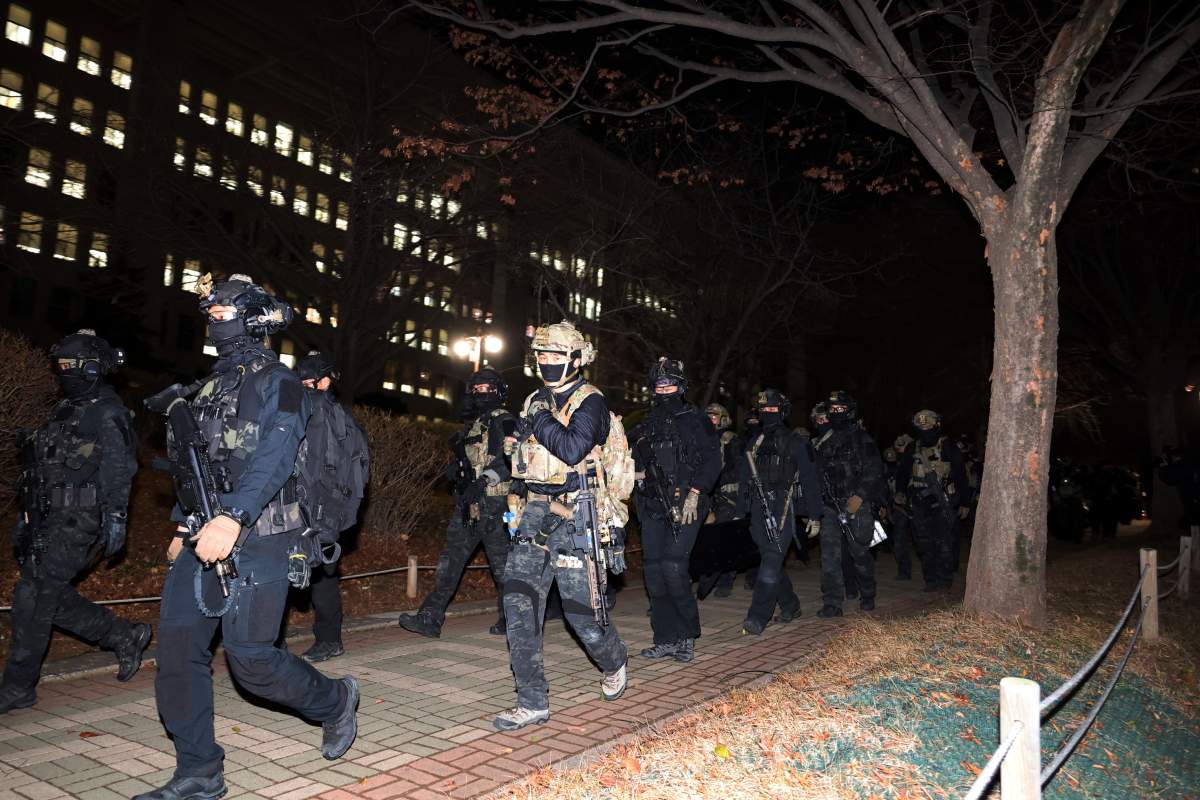
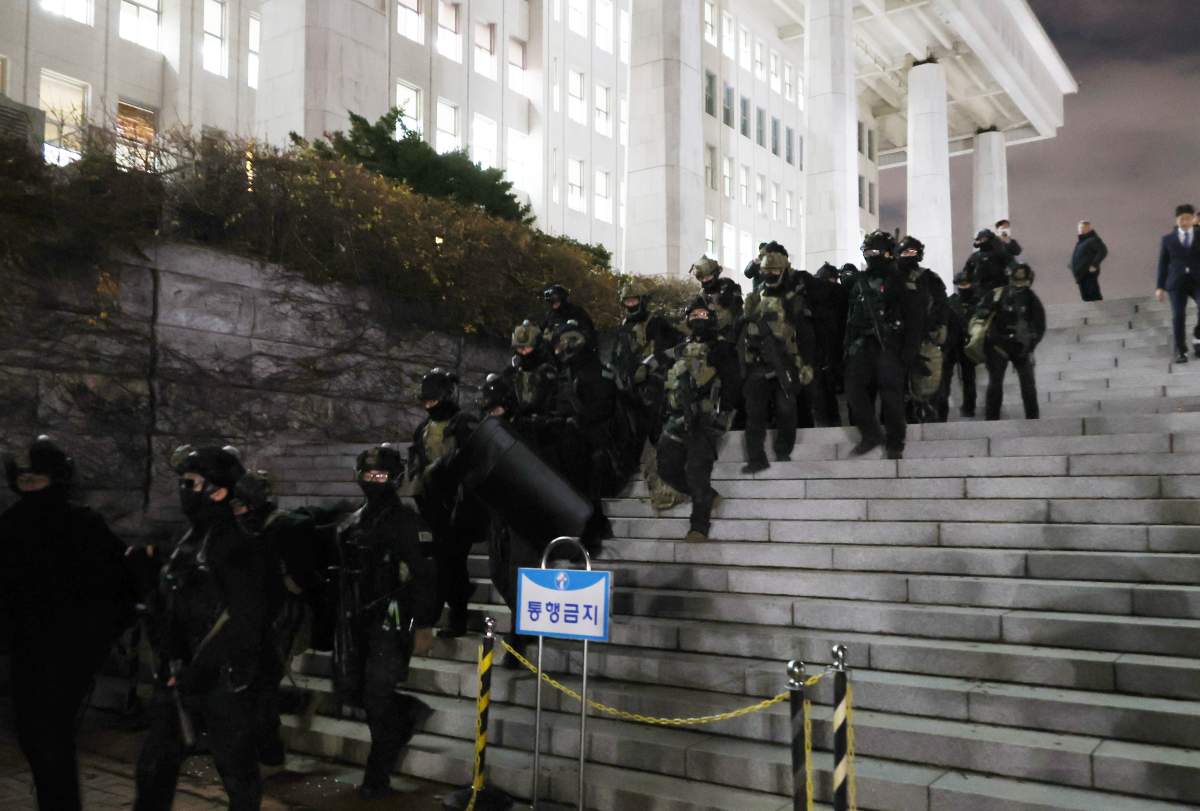
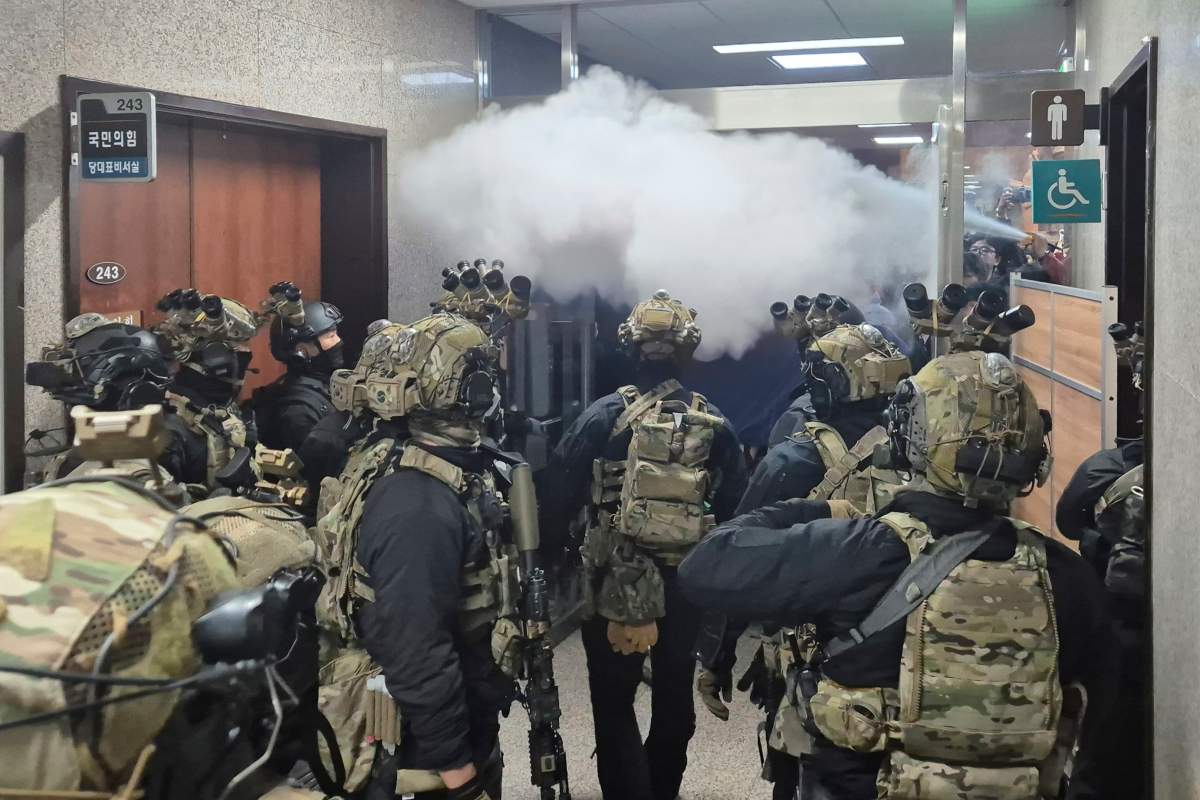
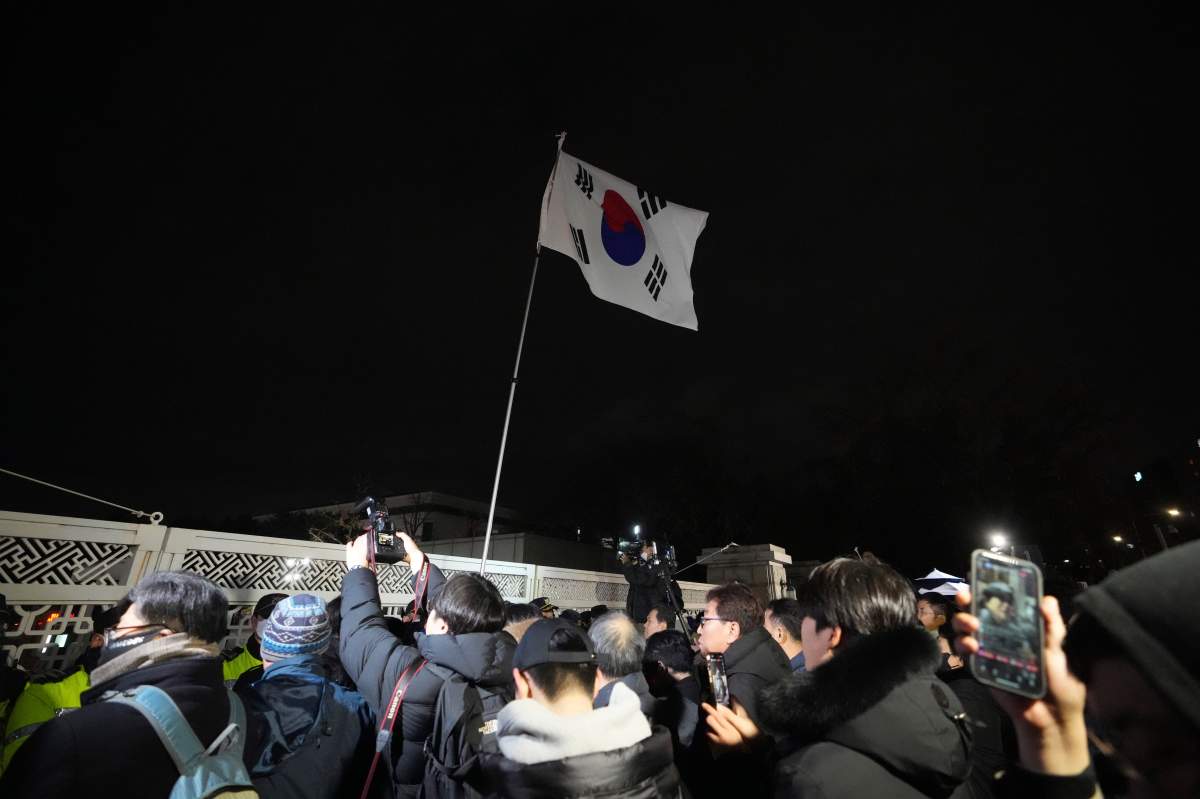
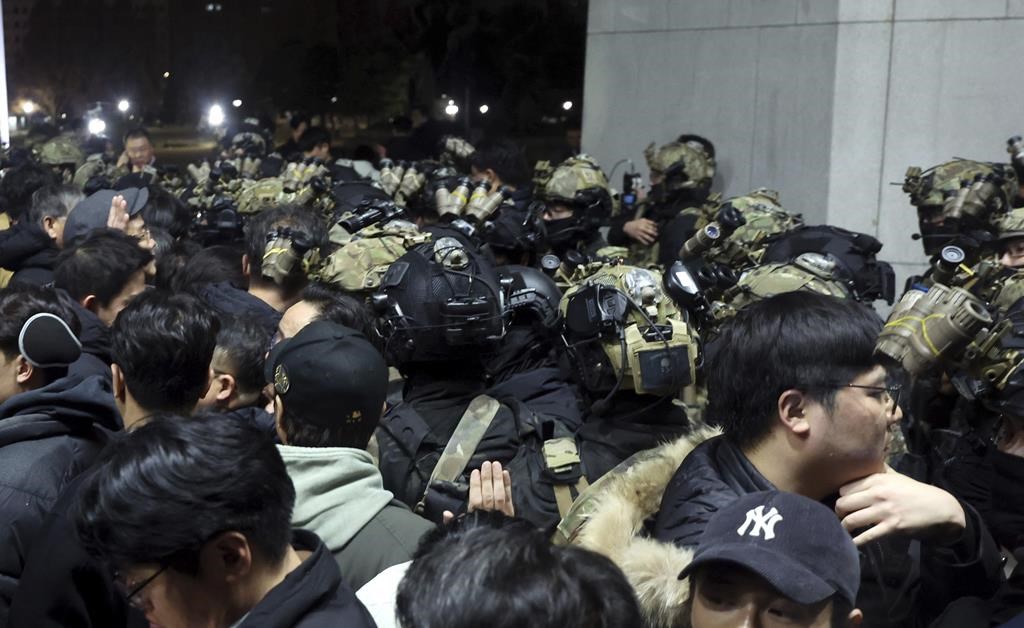

Comments